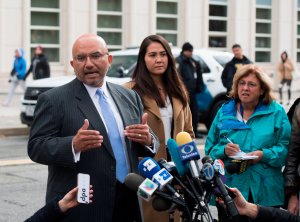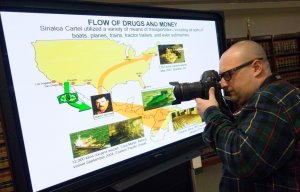Given cartel boss Joaquin “El Chapo” Guzman‘s “history of interference with the judicial process” and “means to harm the jury,” federal prosecutors in New York have asked that potential jurors at his September trial be anonymous, transported by US Marshals and sequestered from the public in court.

But Guzman’s attorney, in opposing a motion for an anonymous and partially sequestered jury, said prospective panel members have nothing to fear.
“Such an order would unduly burden Mr. Guzman’s presumption of innocence, impair his ability to conduct meaningful voir dire (examination of potential jurors) and create the extremely unfair impression that he is a dangerous person from whom the jury must be protected,” Eduardo Balarezo wrote in a motion filed this week in US District Court for the Eastern District of New York.
The sensational Brooklyn trial, originally set to begin in April, will give the notorious boss of the Sinaloa Cartel and master of escape an opportunity to defend himself against a 17-count indictment alleging that he headed a criminal enterprise responsible for importing and distributing massive amounts of narcotics and conspired to murder rivals. He has pleaded not guilty.
Escapes, corruption and armed guards
In their motion to US District Judge Brian Cogan, federal prosecutors asked that the names, addresses and employment of prospective jurors not be revealed and that the panel be transported to and from the courthouse by the US Marshals Service.
The motion also asked that the jury be “sequestered from the public while in the courthouse.”
Prosecutors cited Guzman’s “history of interference with the judicial process,” including two dramatic prison escapes in his native Mexico and his alleged use of “sicarios,” or hit men, to murder rivals and potential witnesses.
The hit men carried out hundreds of acts of violence, including murders, assaults, kidnappings, assassinations and acts of torture at the direction of Guzman, according to prosecutors.
The prosecutors claim Guzman “hindered the judicial process twice by engineering and organizing his own escapes from prison, engaging in widespread corruption related to public officials, and hiring hit men to engage in acts of violence against rivals and suspected government cooperators,” the motion states.
In 2001, Guzman escaped from a prison in a laundry cart with the help of corrupt prison officials.
Then, in 2015, he did it again. Associates dug a tunnel into the shower of his prison cell from an abandoned home more than a mile away. In a widely circulated video of the breakout, Guzman is seen in his cell descending a ladder into the tunnel. He rode a motorcycle to the other end of the tunnel.
After the two escapes, Guzman employed “hundreds of armed guards and others prepared to help him evade detection and recapture,” the motion said. That suggests “a vast network of assistance in place even while confined.”
Potential jurors could fear retaliation from associates of Guzman, leaving them “unable to adequately perform their duties as jurors — if their identities are publicly available,” the motion states.
“Not only has the defendant demonstrated both his ability to direct his drug empire while incarcerated as well as his control of a vast network of criminal associates, the defendant also possesses the financial means to procure assistance in interfering with the judicial process,” prosecutors wrote.

‘Nothing short of a bad joke’
Balarezo wrote that the suggestion of a vast network of criminal associates “is nothing short of a bad joke.”
He said the case against Guzman is largely based on “numerous cooperating witnesses who will testify at trial in exchange for reduced prison sentences.” Those same witnesses will be used to justify an anonymous and partially sequestered jury, he said.
“An anonymous jury — especially one that would be permitted to function only under armed guard — would poison the atmosphere of the case and serve to bolster the government’s proof by creating the impression that Mr. Guzmán is guilty and dangerous,” Balarezo said.
The attorney said his client is not permitted non-legal visits except from his 6-year-old twin daughters. Those visits are monitored. And Guzman is permitted two 15-minute telephone calls — also monitored — per month to his sister and mother.
He’s not allowed to pass messages to third parties. During a visit with the twins, Balarezo said, a government agent interrupted and told Guzman that he couldn’t use the girls to send a greeting to their mother.
“There simply is no way that Mr. Guzman could engage in any kind of jury tampering even if he so desired,” the attorney wrote.
‘A fair compromise’
Balarezo said Guzman has suggested keeping the juror’s identity from the public and media as “a fair compromise.”
“The Court can issue an order directing counsel not to share the information with Mr. Guzman, the media or others not involved with jury selection,” he wrote.
Balarezo said jurors could be prejudiced by the idea the extra security measures and armed transport are in place “for their safety.”
Guzman, 60, who is commonly known by his nickname “El Chapo,” which loosely translates as “shorty,” was extradited to the United States from Mexico in January 2017. He was immediately brought to the federal courthouse in Brooklyn for his arraignment.
Solitary confinement in a cold, small cell at a federal lockup in Manhattan has left Guzman forgetting names and places and suffering from hallucinations, paranoia and depression, according to his lawyer.
Guzman also is charged with trafficking-related firearm violations and money laundering involving the smuggling of more than $14 billion in cash from the United States to Mexico.












